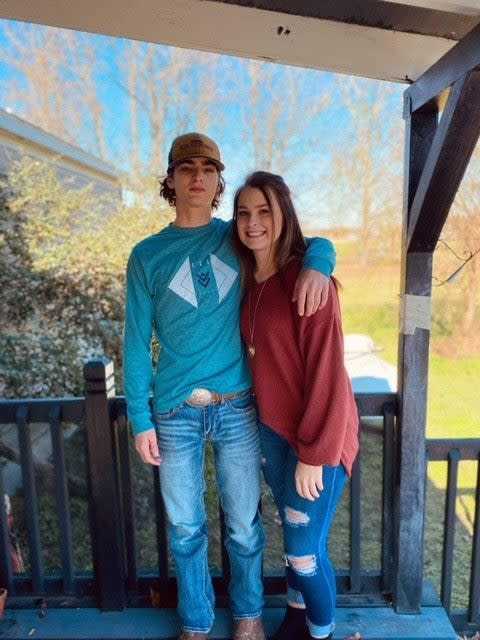Who is Hunter Brittain, the 17-year-old killed by Arkansas police?

Michael Davis, a former police sergeant in Arkansas, has been charged with manslaughter for “recklessly” shooting and Hunter Brittain, an unarmed 17-year-old killed during a traffic stop gone wrong.
“This is something,”Jesse Brittain, the boy’s uncle, told CBS News. “We’re going to take this and see what else [the special prosecutor in the case] has got to say and hopefully this will stick. He won’t be an officer no more and he can’t kill no more kids.”
The case has garnered national attention, as calls for police reform continue around the country in the wake of last summer’s widespread Black Lives Matter protests. Here’s what you need to know.
What happened the night Hunter Brittain died?
Early in the morning of 23 June, Hunter Brittain was hard at work fixing his truck so it would be ready in time to make his construction job at 6am. He took the vehicle for a test drive down Highway 89, outside of the city of Cabot, Arkansas, and was pulled over as the car began to smoke and cause a racket.
The teen was having trouble shifting the truck into park, according to a friend in the car at the time, so Mr Brittain jumped out of the car to retrieve a jug in the truck’s bed he used as a backstop for the ageing vehicle.
Davis, an eight-year veteran with the Lonoke County Sheriff’s office, gave the boy commands to stop and shot him before he could see what he was retrieving, which turned out to be a jug of antifreeze.
Jordan King, a friend of Brittain’s in the truck at the time, said he didn’t hear any commands to stop.
“They didn’t say one word that I know of,” he told KATV. “I didn’t hear it and it happened so fast.”
There is no body camera footage of the incident, though the officer had a camera in his possession.
What happened to the officer who shot Hunter Brittain?
On 1 July, the the sheriff’s office announced it had fired sergeant Davis for failing to comply with the agency’s body camera policy.
“Due to that failure, I have terminated the employment of this deputy,” the sheriff said in a video statement on Facebook. “Without all the evidence I cannot make any determination on whether the shooting was proper.”
What has been the reaction to the shooting?
The family of Mr Brittain, who dreamed of being a NASCAR racing driver, was heartbroken over the shooting and called for full transparency from the sheriff’s department.
“He was my grandson. I’m his grandmother. I’ve had him for the last five years of his life,” his grandmother Rebecca Payne said after the killing. “We’re ready to find out something. It’s time they start letting us know something.”
Community members also rallied behind the Brittain family, demanding “Justice for Hunter.”
The case attracted attention from national civil rights leaders better known for their work with Black Lives Matter. They argued that the shooting shows how police violence affects all people and called for reform.
“The issue of policing is not about Black and white,” Reverend Al Sharpton said at a eulogy for Mr Brittain. “It’s about right and wrong.”
The Brittain family is being represented by Ben Crump, the same civil rights lawyer who represented George Floyd, a Black man murdered by a former Minneapolis police officer last summer.
What happens now?
Davis could be sentenced to up to 10 years in prison if found guilty. He’s currently being held in an undisclosed jail, after being booked in Lonoke County.
His attorney did not respond to a request for comment.
Hunter Brittain’s family has called for police reform, including an end to qualified immunity, the legal doctrine that shields many police officers from legal action when accused of committing crimes in the court of their duty.
“Your life had meaning, you’re loved and your family will not stop advocating until we have justice for you, Hunter,” his uncle Jesse said at his eulogy. “And also justice for all of our other brothers and sisters dying at the hands of law enforcement hired to protect and serve us around this country.”
They have also pushed for state laws that would require officers to have their body cameras on their entire shift.

 Yahoo Movies
Yahoo Movies 